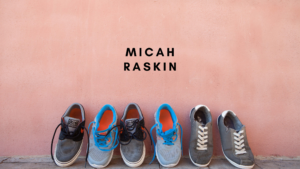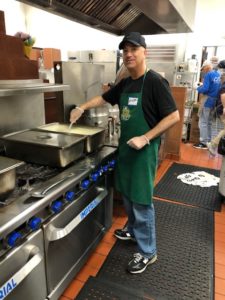Micah Raskin Opens Up About What Drives His Philanthropic Efforts


Professional poker player, Micah Raskin, has created a real and lasting impact on the Queens community through his philanthropic efforts.
Over the past ten years, Micah Raskin has reached a level of success in the professional poker world that few can boast of. He made a splash at his first live event in 2007 and has been counted among the top poker earners in the U.S. ever since. Just four years into his career, Raskin had already made it to sixteen final tables, won four major poker tournaments, and made over a million dollars in winnings. He has appeared in the Bellagio Weekly Tournament, the Borgata Summer Poker Open, and the World Series of Poker–among other of the world’s top poker tournaments.
But Raskin tells us that his real passion is not the game itself, but the good work he can do with his earnings. Micah has used his social standing and his money to contribute to and establish multiple community-based philanthropies and outreach programs.
“My goal is, and always has been, to strengthen the Queens community,” says Micah. “I believe that your community is your family, your bedrock. When you pour into your foundation, you strengthen yourself as well.”
Micah Raskin Discusses The Importance of After-School Programs
“Students who have access to after-school programs receive so many benefits that carry into their future lives,” enthuses Micah Raskin. “They perform better in class, they are less likely to get detention or be in trouble with the law, and they learn how to form meaningful relationships with authority figures.”
Many afterschool programs offer help with homework, facilitate games and playtime that can improve social skills, and provide a safe, supervised environment that keeps children busy and out of trouble.
His own experience with the benefits of after-school programs led Micah Raskin to create an after-school program for grade school children in Queens. “Every child deserves a safe environment that is conducive to learning and developing socially, intellectually, and physically. There are a lot of kids in Queens who don’t have that kind of safe environment at home–or whose parents can’t get home to be with them until after work. Even in a loving home, being left alone for hours at a time isn’t the best-case scenario for developing minds.”
Raskin’s after-school program provides regular homework support for students and gives them the opportunity to relax and build friendships. They’re able to receive more attention and support from adults–something that’s vital in building healthy boundaries and installing a sense of security. These minor changes in their lives can have huge impacts.
“Studies show that kids in after-school programs have fewer behavior problems. As they gain confidence and learn how to direct their emotions, they stop lashing out. You can stop bullying at the source instead of punishing a hurting child,” says Micah.
“Public schools across the country are in dire straights–kids need these kinds of safe havens and productive outlets for their energy and emotions. These programs produce happier, healthier kids who do better in school,” continues Micah Raskin. “I saw the need and I had to help. When you pour into the youth of your community, you end up with a stronger, better community. I love Queens, and I want it to be a great place for the children of this community to grow up.”
Volunteering at the Soup Kitchen Feeds the Hungry – and Your Soul Says Micah Raskin
“I’ve always loved cooking,” says Micah Raskin. “I love to cook for my friends and family–there’s something about feeding people that makes you feel good.”
Micah goes on to say that he believes everyone should be able to access nutritious, high-quality food. “It’s a basic human need–it should be a basic human right.” That’s why the young philanthropist and entrepreneur volunteers regularly with the soup kitchen.
“I’ve always been passionate about making food for my loved ones,” says Raskin. “It felt like a natural extension to start making food for my community and the people who need it most.”
“There are millions of people in America who go hungry every day,” says Micah Raskin. “Women, children, senior citizens, the disabled, veterans…these are people we’re supposed to be taking care of.”
In many soup kitchens in Queens and Nassau County NY, volunteers purchase, cook, and serve meals to the homeless and needy population. “It’s easy to think of poverty, homelessness, and hunger as a distant problem–something that’s prevalent in other countries. It’s jarring and humbling to realize that there are so many people in need right on your doorstep. You can’t unsee it. I just had to do something.”
Micah encourages people to look into opportunities to serve in their own communities. Every major city has soup kitchens and shelters and they are always in need of volunteers and donations. “If you don’t have a lot, just share your time. Often, that’s the most meaningful contribution you could make anyway.”

Micah Raskin Discusses His Efforts to Support Children With Autism
Micah has funded many community outreach programs and philanthropies. “I think the one that’s the most fun for me is my annual BBQ and swim party for the autistic children in my programs,” says Raskin, smiling. “Swimming is therapeutic for many people with autism and it’s so much fun to watch them have a good time and get a chance to just be a kid.”
“There are three major goals that we promote in our swimming programs for children with special needs,” says Micah Raskin. “We want to make sure they have a firm grasp of water safety, that we’re encouraging fun and safe exercise, and that they’re improving their mental and emotional health. You wouldn’t think that swimming could do all that. But being in the water and having access to a pool on the weekends–it’s a huge deal for these kids.”
Research shows that children with special needs benefit from swimming in a number of ways–improved balance, core strength, and overall body awareness are just a few. Many children with disabilities do well in the water because it’s easier to move and it provides a sort of stimulation muffling. You can only feel so much physical sensation at once, and the sensation of the water can block out other, less pleasant stimulation that autistic children are particularly sensitive to.
“It’s so good for them physically, but what fires me up is the joy–that pure ‘I’m a kid’ play instinct that children with autism don’t generally get to experience as often as their neurotypical peers,” says Micah.
Micha Raskin is a long-time believer in community building and the power of giving back. He urges others to follow his example. “You don’t have to have millions to do good,” he says. “You just have to find a need in your community and fill it.”

